8. Oldboy (2003)
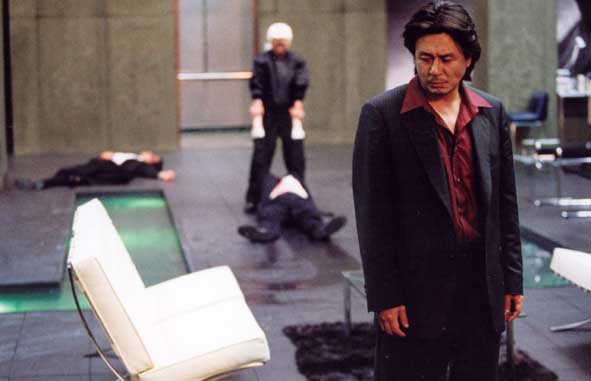
Park Chan-wook’s dizzying, macabre, and devilishly humorous neo-noir takes Nobuaki Minegishi and Garon Tsuchiya’s 1990s Japanese manga and fashions one of the most violent and shocking thrillers you’ll ever bear witness to.
The second installment of The Vengeance Trilogy (preceded by 2002’s Sympathy for Mr. Vengeance and followed by 2005’s Sympathy for Lady Vengeance), the unforgettable Oldboy gives us the obnoxious and initially unlikeable.
Dae-Su (Choi Min-sik), a belligerent drunk, freshly bailed from the clink and then promptly snatched from the street, only to awaken in a cell, where he mysteriously remains for the next 15 years. Drugged to unconsciousness when human contact is unavoidable, Dae-Su otherwise has only a TV set as company. And then, as sudden as his abduction, he’s released, and is invited to track down his jailer, hammer in hand.
There’s an infamous sequence with an octopus but surely it’s the film’s face-slappingly brutal denouement that will linger with the viewer evermore.
7. Idiocracy (2006)
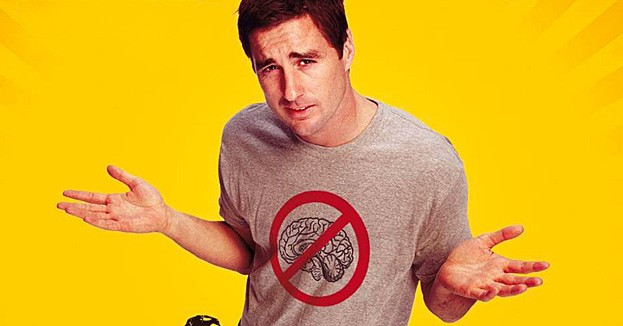
In the years since Mike Judge’s magnificently undervalued sci-fi satire Idiocracy was released, many have noted that Trump’s America is far too familiar after having seen this unknowingly prophetic dystopian glance at an idiotic future United States.
Idiocracy opens in the year 2005 where we meet the extremely average US Army librarian, Corporal Joe Bauers (Luke Wilson). Joe is chosen to participate in a hush hush military experiment that places him in hibernation for a year, along with another subject, a woman named Rita (Maya Rudolph).
After a series of snafus that has both Joe and Rita’s project mothballed and forgotten, they are mistakenly left in suspended animation until 2505, when they are accidentally revived. It is here that the two discover a future world of moronic imbeciles, the human stock having dwindled ginormously, leaving a race of idiots wherein our very average Joe is suddenly considered a brainiac, and quite possibly the smartest man in the world.
Without giving too many of the gags away, one of Idiocracy’s great pleasures derives from Terry Crews’ hilarious performance as the imbecilic but personable President Dwayne Elizondo Mountain Dew Herbert Camacho, who desperately needs Joe as an advisor to overcome the country’s numerous and many difficulties, all spurned by stupid self-interest and debilitating incompetence.
Idiocracy may just be the smartest stupid comedy around, and if you can watch it without wincing too badly, you might be able to navigate POTUS Trump’s term with the ability to roll with the punches, or at least laugh in self-defense.
6. Donnie Darko (2001)
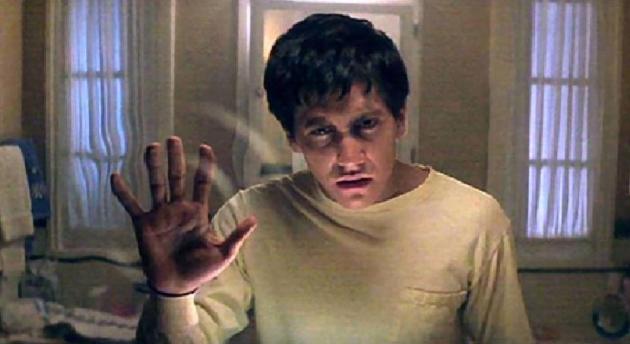
“You’re not a bitch. You’re bitchin’, but you’re not a bitch.”
Donnie Darko may well be writer-director Richard Kelly’s Citizen Kane, and is that really such a bad thing? Filled with emotion, humor, and mind-bending undertakings in the suburbs of American (Middlesex, Virginia, to be more exact) in the late 1980s, titular teenager Donnie (Jake Gyllenhaal) has somehow survived a freak accident. Now occasionally giving audience to a supremely sinister rabbit named Frank (James Duval)––who really wants him to try out time travelling––Donnie also navel gazes at existence, falls in love, and flirts with secret knowledge of enticing potential to affect not only time, but fate as well.
The 80s-era soundtrack adds to the appeal, as do the comeback turns from cast members Katharine Ross and Patrick Swayze. Also excellent in their supporting roles are Maggie Gyllenhaal, and Jena Malone and some quick cameos by producer Drew Barrymore, Seth Rogen, and Noah Wyle.
Unjustly ignored on its initial release––it came out shortly after the 9/11 tragedy and features an alarming plane crash and airplane imagery that were too fluky and unintentionally upsetting at the time––a cult following soon embraced this eerie, intelligent, and exciting psychological sci-fi fable.
5. Napoleon Dynamite (2004)
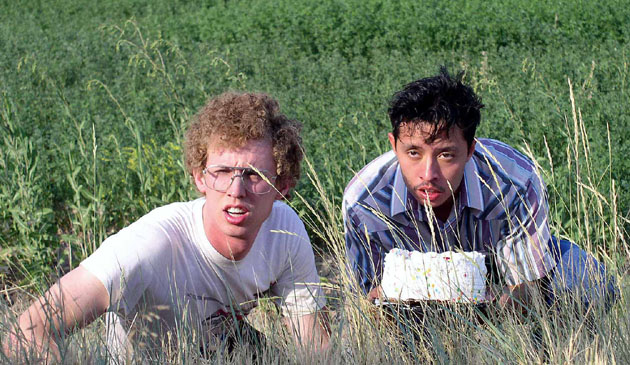
“How much do you want to bet I can throw this football over them mountains?” boastingly asks Uncle Rico (Jon Gries) to his nephews, Kip (Aaron Ruell) and Napoleon (Josh Heder) in the 2004 quirky cult comedy, Napoleon Dynamite.
Written by the wife and husband team of Jerusha and Jared Hess and directed by Jared Hess, this idiosyncratic story of the eponymous awkward teen in small-town Idaho, became an unexpectedly huge hit in the summer of 2004, responsible for, among other things, a swell of “Vote for Pedro” t-shirts across North America and beyond.
Unable and unwilling to fit in, Napoleon’s life somehow manages to get even worse after his energetic grandma (Sandy Martin) is injured in a quad-bike accident while jumping sand dunes. While recovering, grandma enlists the aforementioned Uncle Rico to keep an eye on Napoleon and his nerdy older brother Kip––who never seems to leave the house, spending countless hours “chatting online to babes” and “eating all the freakin’ chips!”
When a new kid from Mexico named Pedro (Efren Ramirez) befriends Napoleon, and a burgeoning love interest with classmate Deb (Tina Majorino) starts to blossom, the group of friends decide to start a campaign for class president with unpredictable, Jamiroquai-addled, and tetherball-instilled results.
Beyond the potentially off-putting bandwagon accolades of this spry little comedy, Napoleon Dynamite is a likeable, laughable, and enduring film, and it’s worth watching for the genius opening credit sequence alone.
4. Wet Hot American Summer (2001)
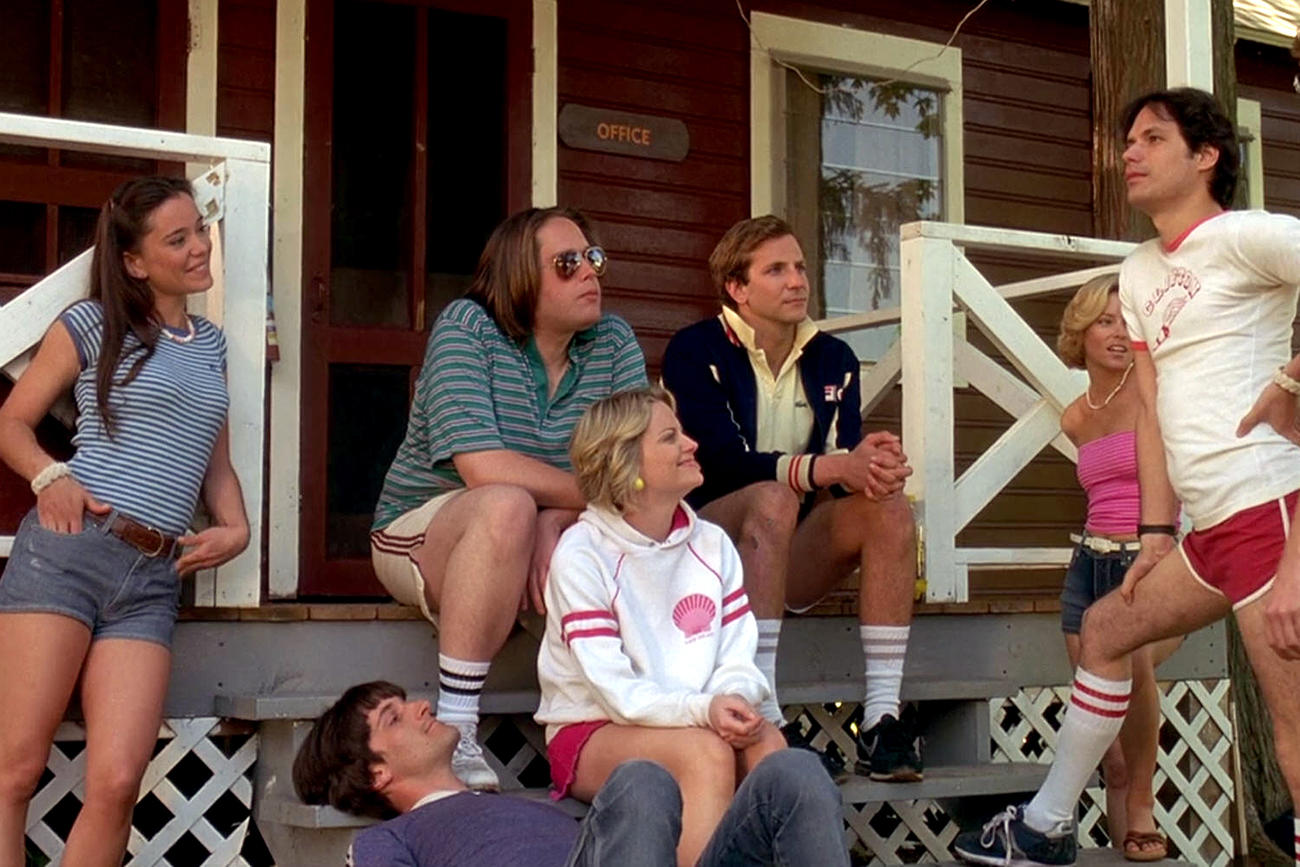
It’s the last day at Camp Firewood for the sticky hot summer season of 1981 in director David Wain’s charming, cheeky, and delightfully dirty-minded Wet Hot American Summer. Written by Wain and co-star Michael Showalter, this crass comedy pays loving tribute to the teen exploitation films of the late ’70s and early ’80s, and more specifically the sub-genre of summer camp films (think 1979’s Meatballs, 1980’s Little Darlings, and 1982’s Porky’s). And in keeping with these adolescent, hormones-raging comedies, the cast of teen camp counselors are deliberately played by actors in their 30s (amongst the gifted comic actors in the cast are Bradley Cooper, Elizabeth Banks, Paul Rudd, and Amy Poehler).
A cult film phenomenon that rewards repeated viewings, Wet Hot Summer possesses that je ne sais quoi that mark many a niche picture; like 1980’s Airplane!, it’s self-aware, breaking the fourth wall to get a good laugh, and similar to Monty Python it romps with an absurdist angle, parodies abounding, often visiting the trashy nabe you’d expect from a John Waters film.
In recent years the Wet Hot American Summer clique has been well rewarded with a brilliant prequel and forthcoming sequel series on Netflix, reuniting Wain and his game cast, as well as introducing many new characters, and outlandish scenarios. But it all started with this multi-episodic comedic home run, highlighted by sensational non sequiturs, ample slapstick, gratuitous makeout sessions, funny, and endearing characters, and not to mention one honey of a talent show. Spend some time at Camp Nowhere and you’ll be a happy camper, too.
3. Let the Right One In (2008)
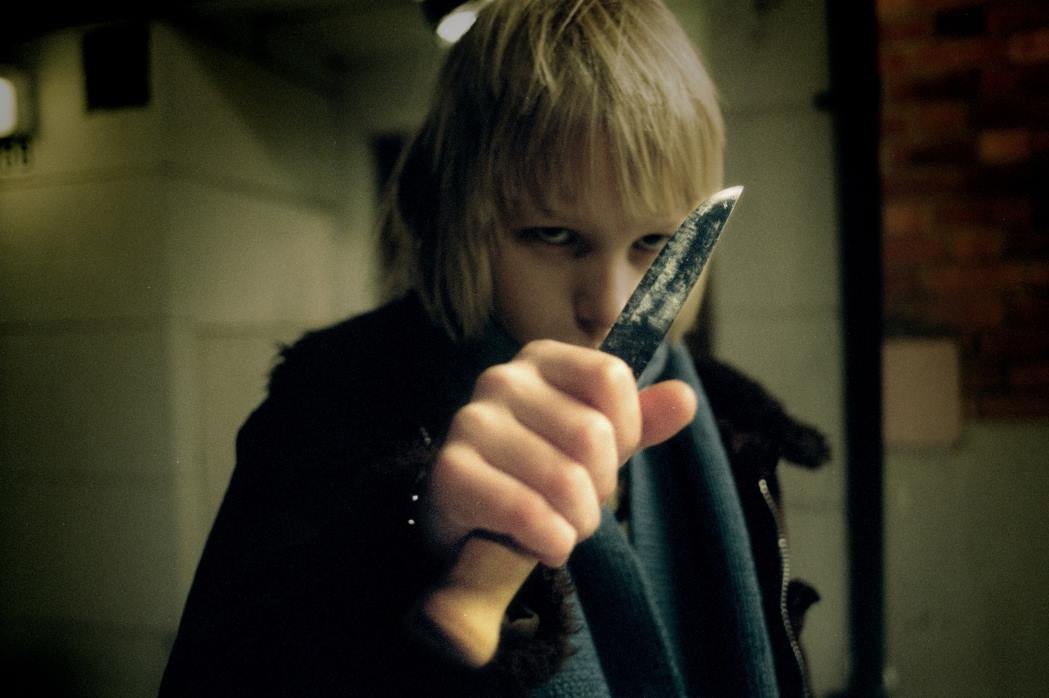
With a startling arthouse sensibility and refreshingly sophisticated emotional depth, Tomas Alfredson’s Swedish vampire film Let the Right One In has become an enduring classic and a high water mark in the overflooded vampire milieu. Adapted by John Ajvide Lindqvist and based off his 2004 novel of the same name, this film is a brilliant merger of romance, horror, coming-of-age comedy, and stirring tragedy.
Oskar (Kåre Hedebrant) and Eli (Lina Leandersson) are both luminous as two lost and lonely kids—one a vampire, one a weirdo, both outcasts—who, for a time, need one another, and need to make sense of the world. Austerely elegant visuals, inventive and endearing re-imaginings of familiar vampire tropes, and pensive yet persuasive symbolism and spectacle, this is modern horror done to perfection. Let the Right One In is felt in the gut and strangely stirs the heart.
2. Shaun of the Dead (2004)
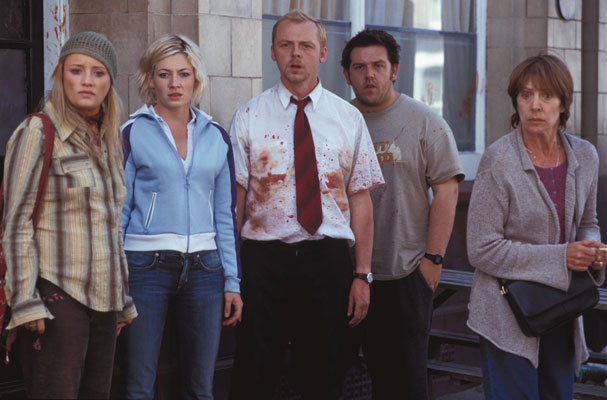
“Yeah, but Big Al says dogs can’t look up!”
If trying to get his act together and be a decent boyfriend to his unfairly ignored girlfriend wasn’t enough of a task for stagnant electronics salesman Shaun (Simon Pegg), there’s also a looming zombie uprising that could just signal the end of days to contend with.
The delightfully pastiche-heavy horror-comedy Shaun of the Dead marked director Edgar Wright and star Pegg’s (they both also co-wrote the knee-slappin’ screenplay) triumphant reteaming––along with Jessica Stevens (who has a great cameo in the film), previously collaborated on the hilarious Channel 4 television series Spaced for two glorious seasons––as well as being the first film in Pegg and Wright’s Three Colours Cornetto trilogy (2007’s Hot Fuzz and 2013’s The World’s End, being the other two).
Combining savvy, scatological, and wry English humor, with George Romero-style horror, Shaun of the Dead has our hapless hero and his freeloading best mate, Ed (Nick Frost) team up amongst a plague of zombies in London, hatching a plan to rescue Shaun’s estranged girlfriend, Liz ((Kate Ashfield), and maybe do a little prioritizing and growing up in the process. Or at least get a few pints in. All told, it’s a classic comedy, and one worth revisiting again and again, got it?
“Okay, but dogs CAN look up!”
1. The Room (2003)
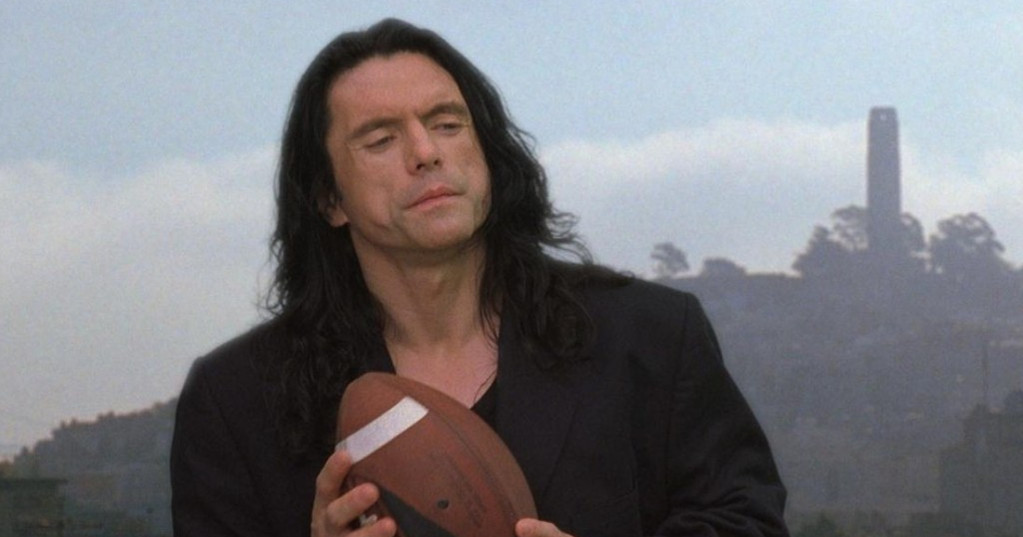
“YOU’RE TEARING ME APART, LISA!”
Tommy Wiseau’s version of auteur arthouse cinema, The Room, is an indulgent mess. Fearlessly foolish, it feels less like the work of a driven filmmaker as it does a detour into a manchild’s tantrum over his ex-girlfriend and his inability to tell a coherent story about it.
It’s a ridiculously bad film; terribly overwritten (while remaining under-plotted), over-acted, overrun with eccentricity, unintentional comedy, and idiotic technical flourishes. As the abysmal “plot” unfolds—something to do with a spurned lover planning revenge—unconscious camp ensues.
Wiseau, who wrote/directed/starred and produced, originally presented his film as a dirge-like drama akin to Goethe’s literary classic, The Sorrows of Young Werther. When midnight screenings on campuses began across the US, coeds clung to The Room’s ironic underpinnings, embracing the atrocious performances and plot holes, screaming at the screen and devising rituals to enrich the melodrama.
As a post-camp cult phenomenon, Wiseau claims he was always in on the joke. Yeah, right. But man, what a joke. And it’s a must see on the big screen at any one of the numerous late night showings at rep cinemas the world over.
Honorable Mention:
Limiting this list to 25 films spanning well over a decade bustling with great cult films was no easy task so here’s a short list of secondary titles also amongst the best of the 21st Century: Waking Life (2001, directed by Richard Linklater), Gozu (2003, directed by Takashi Miike), House of 1000 Corpses (2003, directed by Rob Zombie), Sin City (2005, directed by Frank Miller and Robert Rodriguez), Borat (2006, directed by Larry Charles), Smiley Face (2007, directed by by Gregg Araki), Viva (2007, directed by Anna Biller), Inside (2007, directed by Julien Maury and Alexandre Bustillo), Grindhouse (2007, directed by Robert Rodriguez and Quentin Tarantino), Black Dynamite (2009, directed by Scott Sanders), The House of the Devil (2009, directed by Ti West), Machete (2010, directed by Robert Rodriguez), Goon (2011, directed by Michael Dowse), Kill List (2011, directed by Ben Wheatley), Father’s Day (2011, directed by Adam Brooks, Jeremy Gillespie, Matthew Kennedy, Steven Kostanski, and Conor Sweeney), Holy Motors (2012, directed by Leos Carax), American Mary (2012, directed by Jen and Sylvia Soska), Dredd (2012, directed by Pete Travis), This is the End (2013, directed by Seth Rogen and Evan Goldberg), Escape From Tomorrow (2013, directed by Randy Moore), WolfCop (2014, directed by Lowell Dean), Ned Rifle (2014, directed by Hal Hartley), The Guest (2014, directed by Adam Wingard), Deathgasm (2015, directed by Jason Lei Howden), Crumbs (2015, directed by Miguel Llansó), Turbo Kid (2015, directed by François Simard), Swiss Army Man (2016, directed by Daniel Kwan and Daniel Scheiner), Prevenge (2016, directed by Alice Lowe), Popstar: Never Stop Never Stopping (2016 directed by Akiva Schaffer and Jorma Taccone), The Void (2017, directed by Steven Kostanski and Jeremy Gillespie).
Author Bio: Shane Scott-Travis is a film critic, screenwriter, comic book author/illustrator and cineaste. Currently residing in Vancouver, Canada, Shane can often be found at the cinema, the dog park, or off in a corner someplace, paraphrasing Groucho Marx. Follow Shane on Twitter @ShaneScottravis.